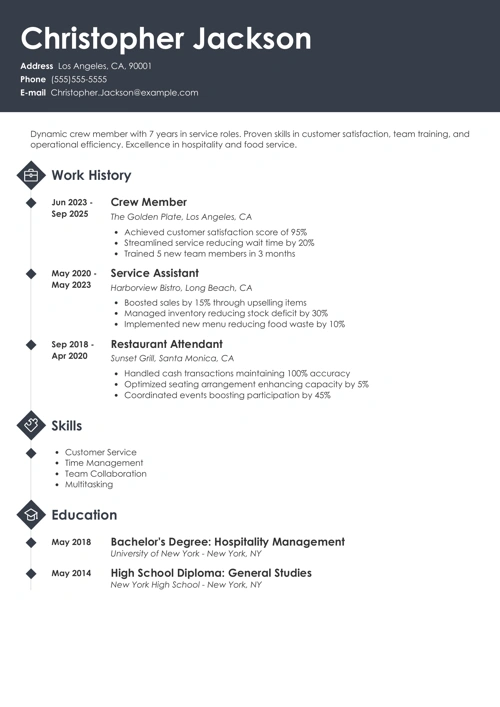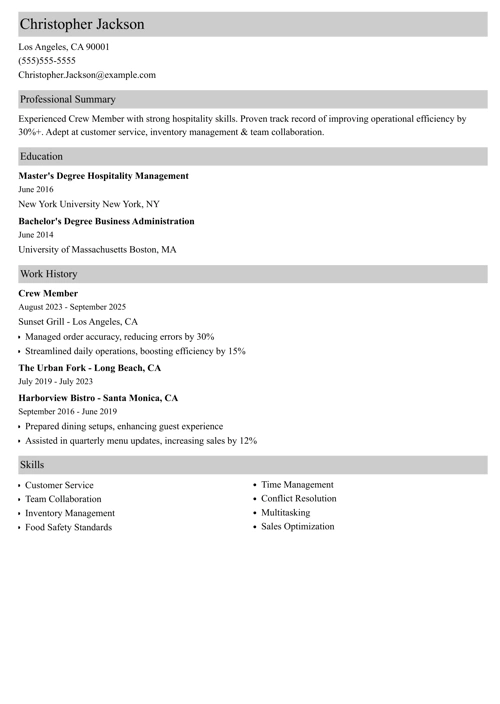You know that asking questions in an interview is essential, but finding the right questions to ask an interviewer can feel like searching for a needle in a haystack.
Good news! We've got the career magnet to attract those good questions to ask in an interview that'll impress interviewers and boost your chances of landing your dream job.
Want to save time and have your resume ready in 5 minutes? Try our resume builder. It’s fast and easy to use. Plus, you’ll get ready-made content to add with one click. See 20+ resume templates and create your resume here.
Sample resume made with our builder—See more resume examples here.
One of our users, Brittanya, had this to say:
Zety really helped me create the best resume possible. It pointed out how things could be better on my existing resume and suggested many things to be re-worded or removed.
Tips on Asking Questions in an Interview
- Ask at least a few questions—asking varied questions during the interview makes the recruiters' lives easier. According to a JobVite report, 29% of them struggle with poor communication skills from candidates during the recruitment process.
- Don’t wait till the end—keep the conversation going by picking good questions to ask during an interview. How do you do that? Keep them relevant to the topic at hand.
- Tailor your questions—research the company thoroughly before the interview and ask questions that reflect your understanding of their business, goals, or recent developments. This shows you're invested in their success and interested in their growth.
- Ask about growth and development—it’s great to ask an interviewer about the current responsibilities of your position or the day-to-day operations of the company. However, make them see that you’re a keeper by asking about growth and opportunities. Show you care about the company and the position by asking how they’re going to develop or move forward.
One last tip: If possible, you can phrase some questions so that they draw attention to your professional strengths. For example: you want to draw attention once more to that impressive degree you worked so hard to achieve. Your resume reflects your core competencies and the strengths you bring to the role.
Interviews are not all about interview questions and answers. You need to think about your smile, feeling calm and confident, getting a good night’s sleep, and more. Read our guide: 50+ Successful Interview Tips, Advice & Guidelines
What Are the Top 5 Questions to Ask an Interviewer?
Asking the right questions during a job interview helps you determine if the role aligns with your career goals and work preferences. Here are five essential questions to consider:
- What does success look like in this role?
Understanding the expectations and key performance indicators can give you insight into how to thrive in the position.
2. How would you describe the team’s dynamics and collaboration style?
This question helps you assess whether the workplace culture and team environment suit your working style. - What are the company’s biggest priorities for the next year?
Learning about the organization’s goals can help you gauge its stability and growth potential while showing your interest in contributing to its success. - What are the common challenges people face in this role?
This allows you to prepare for potential obstacles and demonstrate a proactive mindset in tackling them.
5. How does the company support employee development and career growth?
Asking about training programs, mentorship, or advancement opportunities shows your commitment to long-term success within the company.
These questions not only provide valuable insights but also help you make an informed decision about whether the job is the right fit for you.
Questions to Ask the Interviewer about the Position
Before you can ask the larger-picture interview questions, make sure that you understand everything your position entails.
- What’s the next step in the interview/hiring process?
- How long does your recruitment process usually take?
- What are the primary responsibilities of the position?
- What would my day-to-day routine look like if I got the job?
- What can you tell me about the job apart from what was in the description?
- What would I be expected to accomplish in my first month/year on the job?
- What is the key to succeeding in this role?
- What does it look like during the busiest and toughest times for this role?
- Would I need to travel for the position?
- What kind of hours are expected from me to perform the role at maximum capacity?
- Is overtime expected and/or allowed?
- Could you tell me a little bit about the person I would report to directly?
- What is the onboarding process like for new hires?
- How many people will I be working with?
- If I were hired for the position, what would be the ideal starting date?
- Do you expect the responsibilities for this role to change in the near future?
If you’re clear on the ins and outs of your position and role, you can then move on to larger and more general questions to ask in a job interview.
Pro Tip: Avoid asking the interviewer yes/no questions. Just as they will save their yes/no questions mostly for the job application, your few questions posed should solicit a detailed response. Also, many of these answers can probably be found online.
Good Questions to Ask the Interviewer about the Company
You’ve shown interest in the position, but you should also show the hiring manager or HR director that you’re a team player who would be proud to be part of the company.
Here are some example questions to ask during an interview to demonstrate your interest in the company:
- What is the work culture like?
- Can you tell me what the team is like?
- What model of reinforcement do you use to correct and instruct?
- How long does the average person keep this job?
- How does the position fit with the rest of the organization?
- How does senior management view/interact with the person in this position?
- Is there a career path that someone in this position would be expected to follow?
- What are the prospects for growth?
- Could you go into more detail about the company’s culture?
- How would you describe the overall style of management at the company?
- What do you/employees like most about working here?
- How well do people with my background adjust to working here?
- What could you tell me about the company that isn’t widely known?
- What kind of leadership/management style do you promote in the company?
- How does the company take an idea from inception to completion?
- What would you say is the time spent on creating new products/projects?
These questions show you don’t only think about yourself and how you can get your work done, but rather they portray you as someone who cares about the livelihood and success of the company as a whole.
Great Questions to Ask in an Interview to Show Your Professional Approach
According to the Evolution of Hiring report, 39% of hiring managers want to confirm during the interview that a candidate has a professional demeanor. Asking smart questions in an interview is a simple way to convey you’re a pro.
Let’s look at some more good questions to ask in an interview to reveal that you’re more impressive than your perfect resume and killer cover letter make you out to be:
- Do you base your innovation process more on the Silicon Valley style “move fast and break things” or precision and artistry?
- What kind of processes and technology do you use to work collaboratively?
- How do you measure performance and success in this role?
- How is feedback given to employees?
- Could you tell me what it looks like to get a performance review?
- What would you consider top accomplishments for someone in this role over the next year?
- Are there any special projects that I could work on soon?
- How is information documented and shared across projects and departments?
- What types of people are the most successful here?
- What type of things would I need to achieve to advance within the position/company?
- Is there anything else I could tell you about myself that would help you with your decision?
Ask intelligent questions in an interview so you can leave after making one last strong impression.
Pro Tip: Avoid asking questions with possible answers that are too broad. If you have something broad to ask, split it down into multiple bite-sized questions, and ask them one at a time.
Creating a resume with our builder is incredibly simple. Follow our step-by-step guide and use content from Certified Professional Resume Writers to have a resume ready in minutes.
When you’re done, Zety’s resume builder will score your resume and our resume checker will tell you exactly how to make it better.
Questions to Ask the Interviewer About Challenges, Struggles & Competition
Asking about the company’s pain points and current struggles will allow you to start a conversation about how you can add value to the company by fixing them. On top of that, inquiring about their competition and everyday challenges gives you insight into whether or not the position will be a good fit for you.
Here are some of the best questions to ask in an interview regarding the company’s current challenges, struggles, and competition:
- You mentioned that the team was struggling a bit to work together. How would my role help improve teamwork?
- May I ask why the last person left the job?
- What mistakes have people made in this position?
- Which competitors/products/targets are you most worried about?
- How many people have left the company in the last year?
- What’s the biggest change/challenge the department/company/industry has had to face recently?
- What are the current focus areas for the company as a whole?
- What are the pain points you have to deal with day-to-day that the person in this role should remedy?
Asking questions about the company’s competition and pain points shows that your mindset is already in the role and your head is in the game. This will easily impress them and make it easy to envision you in that position, as well.
Pro Tip: Don’t stick to only one topic when asking the interviewer multiple questions. Show that you’re interested in every aspect of the company, not a particular item that may signal that you’ve had a bad experience or a thorn in your side.
The Best Questions to Ask the Interviewer About Opportunities & Future
Take a look at some sample questions to ask an interviewer at the end of an interview about the company’s opportunities and future:
- How do you reward employees for good work?
- Do you see the role expanding in the future?
- Do you have any on-the-job training?
- Are there opportunities for professional development? If so, what do those look like?
- How many people have joined the company recently?
- Is the company growing?
- Where you would like the company to be in five years?
- What are the company's goals for the future?
- How transparent is the company about operations/revenue/future plans?
When you show that you care about the future success of the company, they’ll be thrilled. This is one of the best ways toward how to succeed in an interview.
Pro Tip: When they ask if you’ve any questions for them, the biggest no-no is to say, “No, nothing comes to mind.” This shows a lack of interest and preparation. Always ask the interviewer at least two questions!
Questions Not to Ask in a Job Interview
Let’s be honest—you need the money; that’s just about the biggest reason for wanting this job.
However, you shouldn’t make it so blatantly obvious. You do not want your hiring manager to think you’re only interested in compensation. Keep questions about salaries, promotions, benefits, perks, and other compensatory items out of your interview.
Also, we mentioned that asking about the work culture is a great way to show your interest in the company. However, if they have a web page dedicated to explaining their company culture like IBM and Netflix do, then asking this will make you look like you couldn’t be bothered to do even minimal research or preparation.
Another common mistake is to inquire during the interview about how that interview went or if you got the job. Save this for the follow-up email, or, better yet, give them time to approach you with their decision. Finally, don’t exude impatience by asking when you’ll hear back from them.
These are all big no-nos.
When faced with the employer asking, “So, do you have any questions for me?” here are some of the worst final questions to ask interviewers:
- So, how did I do in this interview?
- Well, how ‘bout it? Did I get the job?
- How often do you give out raises?
- How often do you hand out bonuses?
- What kind of perks and benefits can I expect?
- When can I expect to hear back from you?
- When do you plan on making someone an offer for the job?
- What does this company actually do?
- How soon can I request vacation time after you hire me?
Unlike what your grade school teachers may have taught you, there are stupid questions when it comes to interviews. Most of them are “me” questions, those where you put yourself before the interests of the company.
Pro Tip: Don’t ask too many questions, either. You don’t want to look like you didn’t do any research before the interview, and you shouldn’t overstay your welcome. Take hints. If they look like they’re losing interest, wrap it up!
To feel more prepared for your interview, check:
- How to Prepare for a Phone Interview
- How to Answer What Are Your Weaknesses
- Situational Interview Questions and Answers
- What Are Illegal Interview Questions
- What Should You Bring to an Interview
- What Are Interview Questions for Managers
- STAR Method for Acing Behavioral Interview Questions
- Thank You Email After a Job Interview: Examples & Writing Guide
- "Why Should We Hire You?" Best Answers + Expert Advice
Plus, a great cover letter that matches your resume will give you an advantage over other candidates. You can write it in our cover letter builder here. Here's what it may look like:
See more cover letter templates and start writing.
Key Takeaway
When the interviewer says, “Well, that’s about it. Do you have any questions for me?” You’ve to ask something to show that you’re prepared and that you care.
Make sure you ask at least two good questions in an interview to prove that:
- You’re interested—ask questions of the interviewer that show your interest and enthusiasm for the position, the company, and any immediate tasks or special projects you may be given.
- You’re impressive—ask the employer questions that are deep and meaningful instead of simple yes-no questions. Allow your questions to reiterate how impressive you are for the role. Know how to ask good questions.
- You’re insightful—ask the interviewer questions about the company’s future and opportunities for the role, but also about current struggles, pain points, and challenges they face.
If you follow these steps, you’ll know how to end an interview. You’ll be sure to be the most impressive interviewee for miles. And once you’ve put the interview behind you, make sure you follow up with a thank-you note!
About Zety’s Editorial Process
This article has been reviewed by our editorial team to make sure it follows Zety's editorial guidelines. We’re committed to sharing our expertise and giving you trustworthy career advice tailored to your needs. High-quality content is what brings over 40 million readers to our site every year. But we don't stop there. Our team conducts original research to understand the job market better, and we pride ourselves on being quoted by top universities and prime media outlets from around the world.





